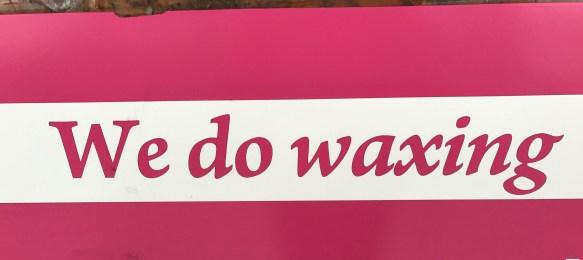NYU, not you too! I took a noncredit course there recently, but the quality of the content and discussion sadly did not match this letter sent from New York University’s administration. Take a look:

If I “continuously check” my schedule, I’m on the ALBERT website 24/7. Is that what you demand of me, NYU? I’m interested in learning, but I have to protect my eyeballs. Now if you’d asked me to check my schedule “continually,” I could log on from time to time to see what’s new.
If I didn’t find proper usage at a university, why was I expecting correct spelling in a sign? Usually I resign myself to four or five errors per walk, and I normally don’t bother posting misspelled words. But this one’s an exception:

Seen in a paint store so high-end that its rear touches the sky, the sign attempts to match vocabulary level to price. Notice “formulation” instead of “formula,” “master craftsman” (just one guy does it all), and “curated collection.” I’ve already written about the trend toward “curation” instead of, say, “selection” in a post entitled “Curation Nation” at http://www.grammarianinthecity.com/?p=1576, so I won’t bother snarking about that part of the sign. But if you’re paying top dollar for small batches in formulations by a master craftsman in a curated collection, shouldn’t somebody spell “intricately” right? Indeed, as I tried to type “intracately” just now, autocorrect kicked in. It’s actually hard to make a mistake with that word, but I guess if you’re on the “master” level, you can manage.
Next one is a sentence from a mystery novel:

I’m assuming the author meant “preyed.” As a writer myself, I know that errors endure no matter how many times I proofread. I also know that a few make it past the editor’s scrutiny. I’m posting this as a reminder to myself to be more careful. Which brings me to this headline in the NY Times:

I wanted to mock the Times for the circle of logic represented by “Failing to Succeed.” After all, what else could you fail at? But on the fourth or fifth reading (yes, I’m a little slow sometimes), I grasped the point. You can’t win outright, so you may as well compromise. This one is clever, not wrong. So in the spirit of compromise, I’ll continuously try to fail at success, pray on all wildlife (who could use a little help from heaven), and consider repainting the living room with a curated color.
Well, maybe not the curated paint. I have to have some standards, and I’m drawing the line at “intracate.”



























